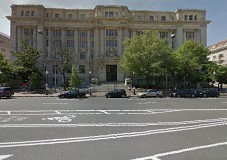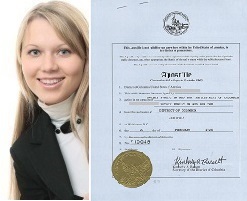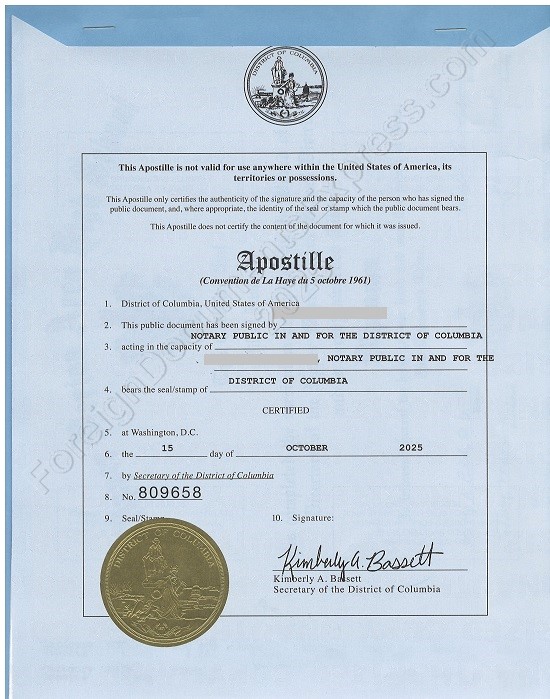 DC apostille guidelines:
DC apostille guidelines:
The following documents can be authenticated by an apostille issued by Washington DC Secretary of State:

original documents notarized by DC notaries public (e.g. letters, powers of attorney, consents, resolutions, etc.)

DC vital records (birth certificates, marriage certificates, death certificates)

DC divorce records issued by DC courts
 corporation documents bearing the signature of DC Secretary of State
corporation documents bearing the signature of DC Secretary of State
original diplomas and transcripts (not notarized, from any state, from any country)

copies of diplomas and transcripts (scanned copies by email, no originals required, from any state, from any country)

copies of passports, IDs, social security administration letters (from any state)

copies of different documents originating from foreign countries, the documents may be in foreign languages, no translation required.
Frequently asked questions: DC apostilles
What is a Hague apostille?

If you plan to live, work, get married, study, or conduct business outside the U.S., most likely, you will be asked to have your documents apostilled or authenticated (legalized). If your document is intended for a foreign country, in most cases, it cannot be presented as is. It needs to bear certain seals that will make it legal and valid outside the United States. If the country of intended use is Hague country (a country that joined the Hague Apostille Convention), then the document has to be legalized by an Hage Apostille. Apostilles are sometimes called "international notary certificates".
What do DC apostilles look like?

Description: In Washington DC, as in all states of the United States of America, an apostille is a separate page attached to the document. It is attached to the document by two staples. As required by the Hague Apostille convention, each apostille has the title "Apostille", the reference to the Hague Convention, and the following ten items: (1) country where the apostille is being issued ("United States of America"); (2) name of the official (whose signature is being certified by an apostille); (3) the position or capacity of this official (4) name of the seal on the attached document, (5) name of the city where the apostille is being issued ("Washington DC"); (6) the date when the apostille is being issued; (7) position of the official person who signed the apostille ("Secretary of the District of Columbia" in case of DC apostilles, and "Assistant Authentication Officer" in case of federal apostilles); (8) consecutive number of the apostille"; (9) the seal of the apostille issuing agency (the Seal of the DC Secretary of State, in case of DC apostilles, and the Sela of the U.S. State Department in case of federal apostilles; (10) signature. In addition, apostilles issued by the DC Secretary of State have the following text: "This apostille is not valid anywhere within the United States of America, its territories or possessions. This apostille only certifies the authenticity of the signature and the capacity of the person who signed the public document, and, where appropriate the identity of the seal or stamp which the public document bears. This apostille does not certify the content of the document for which it was issued."
Does a DC apostille confirm that a document is authentic?

An apostille confirms only the authenticity of the signature of the person on the attached document (e.g. a notary public, the Registrar of Vital Statistics, etc.) and the authenticity of the seal or stamp, if any, on the attached document. Apostilles do not in any way confirm the content of the document.
Can a DC apostille be rejected by a foreign receiving agency because it is just stapled to the document? Some countries insist that the document and an apostille are ribboned together.

According to the provision of the Apostille Convention, apostille issuing authorities cann attach apostilles to the document in any way they see fit. Different countries different procedures and use different ways of attaching apostilles. The DC Secretary of State uses staples. According to the Apostille Convention "Failure to affix an apostille to the public document in a particular manner is not a basis for refusing an apostille."
What requirements should a DC birth certificate meet, to be eligible for a DC apostille?

First of all, it has to be a certified copy issued by the DC Department of Health. Plain copies of birth certificates are not eligible. Secondly, it has to be recent. If your document was issued a long time ago, most likely, the signature of the Registrar is no longer on file, therefore the birth certificate cannot be apostilled.
Email a copy of your document for a free evaluation, to make sure it will qualify for a Washington DC apostille.

![]() DC apostille: $225
DC apostille: $225![]() Please complete the Order Form and mail it with your original document(s) to
Please complete the Order Form and mail it with your original document(s) to No hidden fees.
No hidden fees. DC apostille guidelines:
DC apostille guidelines: original documents notarized by DC notaries public (e.g. letters, powers of attorney, consents, resolutions, etc.)
original documents notarized by DC notaries public (e.g. letters, powers of attorney, consents, resolutions, etc.) DC vital records (birth certificates, marriage certificates, death certificates)
DC vital records (birth certificates, marriage certificates, death certificates) DC divorce records issued by DC courts
DC divorce records issued by DC courts corporation documents bearing the signature of DC Secretary of State
corporation documents bearing the signature of DC Secretary of State original diplomas and transcripts (not notarized, from any state, from any country)
original diplomas and transcripts (not notarized, from any state, from any country) copies of diplomas and transcripts (scanned copies by email, no originals required, from any state, from any country)
copies of diplomas and transcripts (scanned copies by email, no originals required, from any state, from any country) copies of passports, IDs, social security administration letters (from any state)
copies of passports, IDs, social security administration letters (from any state) copies of different documents originating from foreign countries, the documents may be in foreign languages, no translation required.
copies of different documents originating from foreign countries, the documents may be in foreign languages, no translation required.

